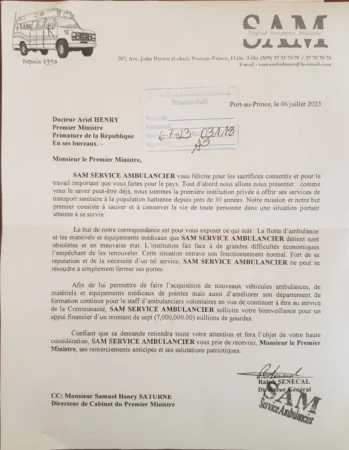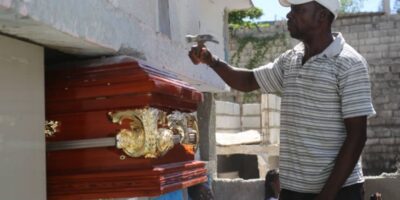Only three ambulance companies are authorized to operate in Haiti, reveals the National Ambulance Center to AyiboPost. However, at least forty private ambulance services operate in the country.
Of more than forty private ambulance operators observed in Haiti, only three are duly authorized to operate by the State, reveals Doctor Didié Hérold Louis, the director of the National Ambulance Center (CAN).
The ambulance certification process, which started in 2019, ensures vehicle inspections, verification of staff competencies, compliance with standards – including the application of a compliance sticker – to avoid the circulation of ambulances inadequate and under-equipped, which endangers the lives of users.
Read also : Perspective | Port-au-Prince et ses vieux bus réputés pour leur délabrement
The ambulance must renew its certification every two years for 25,000 gourdes. At least one CAN communication mentions Polymed, Sam Ambulance and Hero as participants in the institution’s activities. It is not clear whether they are certified.
The circulation of illegal vehicles operating as ‘ambulances’ is a result of “the crumbling of state authority throughout the country,” according to Dr Didié Hérold Louis.
The CAN was born in 2012. It is under the supervision of the Ministry of Public Health and Population (MSPP). It is the only entity authorized to certify vehicles operating as ambulances on national territory.
The publication of the February 2, 2016 decree, which came 4 years later, gives CAN legal status and autonomy. In accordance with this decree, the institution saves lives and provides the Haitian population with emergency pre-hospital care.
In 2017, the CAN was restructured and two years later, in November 2020, the late president Jovenel Moïse published a decree to appoint a board of directors to head the structure, in line with the decree of February 2, 2016 establishing its creation.
Article 3 of this same decree, prohibits any “private institution from putting vehicles into circulation as ambulances, without these vehicles having been previously certified by the CAN.”
Any violator of this provision is liable to a fine defined by the CAN, but the institution has no concrete examples of sanctions in its records.
It is the only entity authorized to certify vehicles operating as ambulances on national territory.
In practice, certain mortuary transport vehicles not equipped to function as ambulances circulate with this title. “There is no urgency in the transport of corpses,” recalls Dr Louis.
Contacted by AyiboPost, Port-au-Prince city hall indicates that it does not provide any authorization to funeral companies to operate vehicles as ambulances in the metropolitan area of Port-au-Prince.
« The mayor’s office only issues an annually renewable operating permit to funeral companies, nothing more, » acting magistrate Lucsonne Janvier tells AyiboPost.
Read also: Disparition et mutilation mystérieuses de cadavres dans des morgues en Haïti
There is a severe lack of ambulance services in the country.
81 municipalities — out of 146 in the country — do not have access to free services from CAN, which has a fleet of less than a hundred ambulances, according to the institution.
The Haitian Red Cross has thirteen ambulances operating mainly in the metropolitan area of Port-au-Prince.
The humanitarian institution’s 118 telephone reference line is currently dysfunctional, Red Cross coordinator Jean Jacob Charles told AyiboPost.
Read also : AHPsy : Les appels de demande de soutien psychologique explosent en Haïti
According to a Haiti Priorise report published in 2017, of the 514,352 accidents and emergencies reported between 2013 and 2014, the CAN responded to less than 2% of needs, or exactly 9,642 cases.
During the month of October 2023, the institution took care of 858 medical emergency cases throughout the national territory, compared to 771 for the month of August.
CAN faces serious financial and human resources problems.
According to Dr Didié Hérold Louis, CAN had 447 employees before the launch of the U.S. Humanitarian Parole program. But today, only 398 employees still work there.
For the 2022-2023 fiscal year, the institution has a budget of 305 million gourdes, with 205 million gourdes allocated to paying the institution’s staff and 105 million gourdes for its operations.
Out of a fleet of 116 ambulances, only 82 are operational on the national territory and three of them are beyond the CAN’s control.
“We need nine employees per ambulance. For 82 ambulances, that’s 738 ambulance workers,” says Dr Louis.
The sector also faces financial problems.
SAM Ambulance Service has been operating in the country since 1993.
“Our equipment and our ambulances are old and break down all the time, because we do not have enough resources to refurbish them,” says the CEO of SAM Ambulance, Ralph Sénécal, noting that the company’s ambulance fleet numbers seven.
“We have already fired all of our employees. We currently pay them for each service rendered,” declares Sénécal, who says he was obliged to make a request for financial support from the State in July 2023.

Letter from SAM AMBULANCE SERVICE to Ariel Henry.
By Fenel Pélissier
Cover Image : Centre Ambulancier National
Stay in touch with AyiboPost through :
► Our WhatsApp channel : click here
► Our WhatsApp Community : click here
► Our Telegram canal : click here







Comments